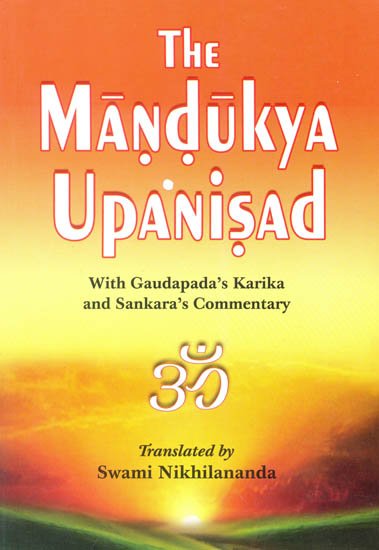Mandukya Upanishad (Gaudapa Karika and Shankara Bhashya)
by Swami Nikhilananda | 1949 | 115,575 words | ISBN-13: 9788175050228
This is verse 4.79 of the Mandukya Karika English translation, including commentaries by Gaudapada (Karika), Shankara (Bhashya) and a glossary by Anandagiri (Tika). Alternate transliteration: Māṇḍūkya-upaniṣad 4.79, Gauḍapāda Kārikā, Śaṅkara Bhāṣya, Ānandagiri Ṭīkā.
Mandukya Karika, verse 4.79
Sanskrit text, IAST transliteration and English translation
अभूताभिनिवेशाद्धि सदृशे तत्प्रवर्तते ।
वस्त्वभावं स बुध्वैव निःसंगं विनिवर्तते ॥ ७९ ॥abhūtābhiniveśāddhi sadṛśe tatpravartate |
vastvabhāvaṃ sa budhvaiva niḥsaṃgaṃ vinivartate || 79 ||79. On account of attachment to the unreal objects, the mind runs after such objects. But it comes back (to its own pure state) when it becomes unattached (to objects) realising their unreality.
Shankara Bhashya (commentary)
Attachment to the unreal (objects) is due to the firm belief that duality exists, though in reality such duality is ever non-existent. On1 account of such attachment which is of the nature of delusion caused by ignorance, the mind runs after objects corresponding to those desires. But when a man knows the unreality2 of all duality of objects, then he becomes indifferent to them and turns away his mind from the unreal (objects) to which he feels attached.
Anandagiri Tika (glossary)
1 On account, etc.—It is desire, due to ignorance, that creates objects around us.
2 Unreality, etc.—The only way to become detached from the world is to know its unreal nature by following the Vedāntic method of reasoning. The Yogic method of mechanical concentration may make the mind oblivious of the world for the time being, but when that concentration is relaxed, the world with its objects again appears as before. Vedāntic Knowledge alone convinces one of the illusory nature of the world.
